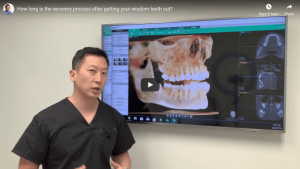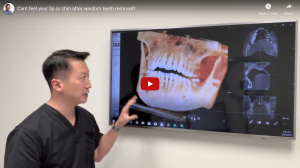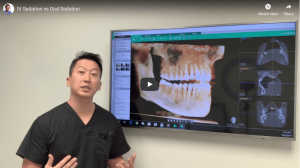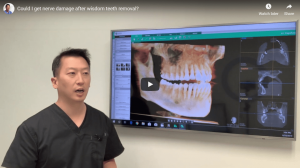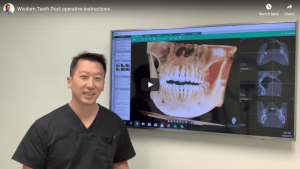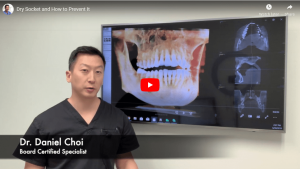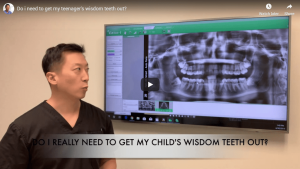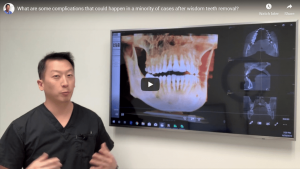What are Wisdom Teeth?
Third molars, or more commonly known as “wisdom teeth,” usually erupt between the ages of 17 and 21. Wisdom teeth are more prone to problems when they break through the gum tissue, since there is usually little room available for them. Therefore, they may become impacted or erupt sideways which can cause infection, pain and swelling. If you are facing any of these conditions, your dentist may recommend wisdom teeth removal before it becomes more complicated to extract them. Wisdom teeth extraction can be complicated if the teeth haven’t erupted through the gum line however, it is a common oral surgery. You should always use a board-certified surgeon to perform surgical procedures. There are disadvantages to keeping your wisdom teeth which may include jaw pain, shifting of surrounding teeth and infections.
Receive 20% Off Your Wisdom Teeth Removal Surgery
Wisdom Teeth Symptoms
Wisdom Teeth symptoms that can lead to them needing to be removed may include:
- Pain behind the molars near the back of the mouth. As the wisdom teeth grow in, the pain will increase as they press on bone and nerves, crowd the surrounding teeth and grow in sideways or misaligned.
- You may experience swelling, tenderness, pain and redness. Infections can develop as wisdom teeth erupt which allows bacteria to enter. This can affect your general health.
- Neighboring teeth can block the wisdom teeth from erupting properly which causes them to become impacted. They essentially become “trapped,” their roots will continue to grow and the longer they are impacted, the more likely they are to cause trouble.

Impacted Wisdom Teeth Symptoms
Not everyone experiences symptoms with impacted wisdom teeth. Many people do not even realize they have impacted wisdom teeth. The most common symptom of an impacted wisdom tooth is infected or swollen gums on top of the tooth. You may also experience bleeding gums, swelling, headache, jaw ache, bad breath and pain. On occasion, some people get a stiff jaw or swollen lymph nodes in their neck.
Receive 20% Off Your Wisdom Teeth Removal Surgery
Wisdom Teeth Sedation
There are two types of anesthesia commonly used for wisdom tooth removal. Your doctor will decide the appropriate option for your case depending on the complexity of the procedure and your comfort level.
The two types of anesthesia include:
Local anesthesia- Local anesthesia is administered with one or more injections near the site of each tooth to be extracted. You will have a topical applied to your gums before the injection to numb the area. With only local anesthesia, you would be awake during the procedure. You should not have any pain, but you will feel some pressure.
Sedation anesthesia- Sedation anesthesia is administered through an IV in your arm. With this type of anesthesia, you don’t feel any pain and your consciousness is suppressed, making you feel drowsy or fall asleep. Sedation anesthesia is also used with local anesthesia.
All Sedation options will be presented to you during your consultation. At the time of the consultation a clinical examination of your mouth will be performed by a Dental Specialist. All treatment coordinators will formally go over all treatment plans with you, to guarantee you have all the proper tools to make the right decision going into your surgery.
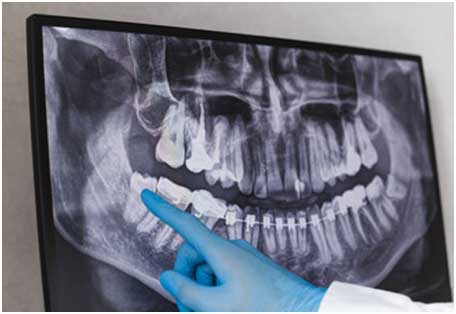
Wisdom Teeth Removal Recovery
How long does it take to recover from wisdom teeth removal? About 5 to 7 days but about 3 to 4 weeks for the gums to fully heal. To ensure proper recovery and healing from the surgery, always follow the take home instructions given to you to avoid infections or complications.
Wisdom Teeth Dry Socket
When the blood clot is lost prematurely at the extraction site, or if it forms improperly, this is called a “dry socket.” Dry sockets from wisdom tooth extraction can delay recovery and be very painful.
There are steps you can take to help prevent a dry socket:
- Avoid smoking after surgery for as long as possible.
- Do not use a straw.
- Avoid eating foods that become easily lodged in the gums such as popcorn and nuts for at least a week.
- Do not consume hot beverages or foods as the heat may dislodge the blood clot

